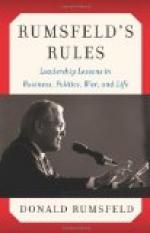The misfortunes in Natal will probably be repaired and the war in time brought to its conclusion—the submission of the Boers to Great Britain’s will. But suppose the dispute had been with a great Power, and that in such a case the military view had been shut out from the day the negotiations began until the great Power was ready? The result must have been disaster and defeat on a great scale. Disaster and defeat on a great scale are as certain to come as the sun to rise to-morrow morning unless the Government arranges to take the military view of war into its midst. There will have to be a strategist in the Cabinet if the British Empire is to be maintained. This is another unpopular view and is hateful to all politicians, who declare that it is unconstitutional. But it does not, in fact, involve any constitutional change, far less change than has been made since 1895 at the instance of Mr. Balfour; and it would be better to alter a little the system of managing the Nation’s affairs than to risk the overthrow of the Empire.
BULLER’S PROBLEM
November 22nd, 1899
The six weeks of anxious waiting are over, and to-day the second chapter of the war begins. On either side of the Boer States a division of Sir Redvers Buller’s force is now in touch with the enemy, and at either point there may be a battle any day.
The small British forces sent out or organised on the spot before the declaration of war have kept the enemy’s principal forces occupied until now, so that he has been unable to make any decisive use of the margin of superiority which he possessed over and above what was needed to keep the British detachments where they were. The resisting power of these detachments is, however, not inexhaustible; they have kept at bay for a considerable time forces much more numerous than themselves, and the first move required of the fresh British forces is to take the pressure off them and to combine with them. The centre of gravity is in Natal, for there is the principal Boer army, probably two-thirds of the whole Boer power, and there, too, a whole British division is invested. A palpable success here for either side must go far to decide the issue of the war.
General Joubert’s force in Natal is so strong that while keeping his grip upon Ladysmith, where Sir George White has not less than ten thousand men, he has been able to move south with a considerable force, perhaps fifteen thousand men, to oppose Sir C.F. Clery’s advance. Sir C.F. Clery has already at least seven, and possibly nine, strong battalions, to which within a day or two three more will be added, and perhaps as many as thirty-six guns, with parties of bluejackets and various Natal levies. His interest is to delay battle until all his force has come up. The advanced troops seem to be spread along the line from Mooi River to Estcourt, and the Boer forces are facing them on a long line to the east of the railway from a point beyond Estcourt to a point below Mooi River. The Boers are on the flank from which their attack would be most dangerous, and seem to aim at interposing between the parts of Sir C.F. Clery’s force, and at a convergent attack in superior strength upon his advance guard at Estcourt.




